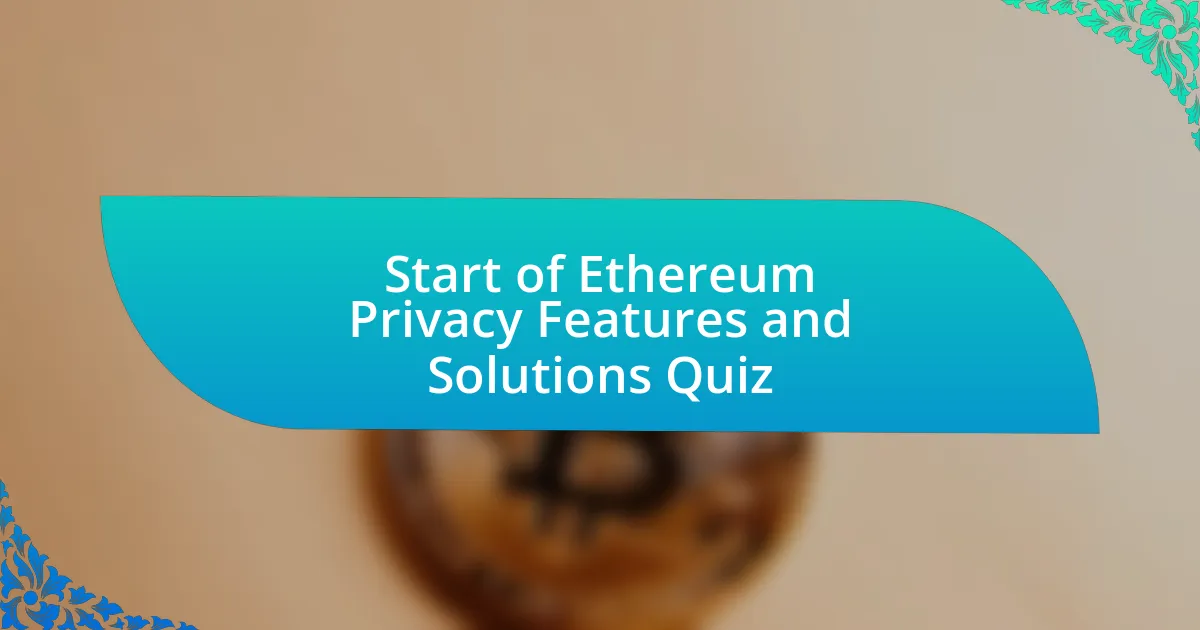
Start of Ethereum Privacy Features and Solutions Quiz
1. What is the primary method for achieving privacy on Ethereum?
- Utilizing public blockchains to log all transactions transparently.
- Using cryptographic tools like zero-knowledge proofs, zk-SNARKs, and off-chain privacy layers.
- Implementing exclusive smart contracts that limit access to information.
- Relying on centralized authorities to manage user data securely.
2. How do ring signatures provide privacy in Ethereum?
- By masking the identity of the blockchain validators.
- By implementing a public key infrastructure for all users.
- By encrypting all transaction data before it is sent.
- By allowing participants to remain anonymous to one another and to those outside the network.
3. What are zero-knowledge proofs used for in Ethereum?
- To allow public access to all transaction details without limitations.
- To prove the truth of a statement without sharing the statement`s contents or revealing how the truth was discovered.
- To enhance the aesthetics of transaction data on the blockchain.
- To increase the speed of transactions through the Ethereum network.
4. What is the purpose of zk-SNARKs in Ethereum?
- To enhance the performance of smart contracts by executing them on-chain.
- To verify the correctness of off-chain computations and provide zero-knowledge proofs.
- To increase transaction fees and gas costs for users.
- To connect Ethereum with other blockchain networks for cross-chain transactions.
5. How do stealth addresses enhance privacy in Ethereum?
- By allowing users to share their transaction history with others easily.
- By ensuring that transactions are not linked to specific addresses, thereby maintaining user anonymity.
- By creating public address identifiers that can be searched online.
- By associating transactions with unique user profiles for better tracking.
6. What is the role of TEEs (Trusted Execution Environments) in Ethereum privacy?
- To enhance the visual interface of Ethereum applications.
- To store private data off-chain, ensuring that sensitive information remains confidential.
- To provide a decentralized consensus mechanism for Ethereum.
- To execute smart contracts faster and on-chain directly.
7. How do Pedersen commitments contribute to privacy in Ethereum?
- By allowing for the commitment of values without revealing the committed values themselves.
- By requiring all nodes to keep encrypted copies of every transaction.
- By encrypting all transactions automatically before they are recorded.
- By ensuring all user identities are publicly verified on the blockchain.
8. What is the difference between permissioned and private blockchains in terms of privacy?
- Permissioned networks operate without any restrictions, making them less secure than private blockchains.
- Permissioned blockchains are completely open and accessible to everyone, ensuring maximum transparency.
- Private blockchains offer no privacy features and allow all data to be publicly visible.
- Permissioned networks provide some level of privacy by default, while private blockchains require additional privacy layers to be built.
9. What is the purpose of Enigma in the context of Ethereum privacy?
- To ensure all transactions are completely anonymous and untraceable on the blockchain.
- To create a new cryptocurrency that operates outside of Ethereum`s protocols.
- To simplify contract creation for developers without needing any privacy features.
- To enable privacy-preserving smart contracts by utilizing secret contracts that handle private and sensitive data.
10. How do zero-knowledge rollups enhance scalability and security in Ethereum?
- By limiting the number of transactions processed per second, enhancing security at the expense of scalability.
- By storing all transaction data directly on the main Ethereum blockchain, increasing the burden on the network.
- By requiring that all computations occur on-chain, ensuring full transparency but slowing down execution.
- By executing thousands of transactions off-chain and submitting validity proofs for verification on Ethereum, thereby reducing computation on the base layer.
11. What is the significance of recursive proofs in zero-knowledge rollups?
- Recursive proofs reduce the size of transactions by eliminating privacy layers in the blockchain.
- Recursive proofs allow a single ZK-SNARK to verify other ZK-SNARKs, dramatically increasing throughput on ZK-rollups.
- Recursive proofs enable smart contracts to be executed off-chain without verification.
- Recursive proofs enhance the transparency of on-chain data by revealing more information.
12. How do validity proofs work in zero-knowledge rollups?
- Validity proofs involve executing each transaction again to verify them.
- Validity proofs rely on public data to establish the transition validity.
- Validity proofs confirm the correctness of off-chain state transitions without re-executing transactions on Ethereum.
- Validity proofs store all transaction details on-chain for transparency.
13. What is the benefit of using ZK-STARKs over ZK-SNARKs in Ethereum?
- ZK-STARKs are more transparent and scalable than ZK-SNARKs.
- ZK-STARKs rely on centralized validators unlike ZK-SNARKs.
- ZK-STARKs require more computational power than ZK-SNARKs.
- ZK-STARKs are less secure and efficient than ZK-SNARKs.
14. How do confidential transactions enhance privacy in Ethereum?
- By enabling third parties to access and validate transaction information easily.
- By securely storing transaction data on public ledgers for transparency.
- By concealing transaction amounts and other sensitive information, ensuring that only the sender and recipient know the details of the transaction.
- By allowing all network participants to see transaction amounts and details openly.
15. What is the role of Multiparty Computation (MPC) in Enigma`s privacy solution?
- MPC encrypts data but requires all parties to access the complete dataset.
- MPC enables secure computation over private data by distributing the computation among multiple parties, ensuring that no single party has access to the entire dataset.
- MPC verifies transactions by recording all data on a public ledger.
- MPC allows users to randomly generate data keys while sharing private data openly.
16. How do range proofs contribute to privacy in Ethereum?
- Range proofs require sharing exact transaction details for verification purposes.
- Range proofs disclose exact values within a specified range to enhance transparency.
- Range proofs do not influence data privacy in Ethereum transactions or contracts.
- Range proofs allow verification of value ranges without revealing the exact values, enhancing privacy.
17. What is the significance of Nightfall in the context of Ethereum privacy?
- Nightfall is a programming language developed for smart contract creation on Ethereum.
- Nightfall is an open-source privacy solution that enables confidential transactions on Ethereum, enhancing data privacy and security.
- Nightfall is a decentralized exchange platform for trading assets on Ethereum.
- Nightfall is a consensus mechanism used for transaction validation in Ethereum.
18. How do off-chain solutions complement Ethereum`s privacy features?
- Off-chain solutions do not impact Ethereum`s privacy features at all.
- Off-chain solutions require all data to be on the Ethereum blockchain for transparency.
- Off-chain solutions allow for the storage of private data and the performance of high-throughput transactions, reducing the load on the Ethereum mainnet.
- Off-chain solutions eliminate the need for zero-knowledge proofs entirely.
19. What is the difference between public and private data storage in Ethereum?
- Public data can be encrypted, while private data must be stored on the blockchain.
- Public data is stored on the blockchain, while private data is stored off-chain using cryptographic tools and protocols.
- Public data is accessible only by developers, while private data is accessible by anyone.
- Public data is always visible to everyone, while private data is always visible to all participants.
20. How do zk-SNARKs and zk-STARKs differ in their application in Ethereum?
- zk-SNARKs are more compact and faster but less transparent, while zk-STARKs are more transparent and scalable but larger in size.
- zk-STARKs cannot be used for off-chain computations like zk-SNARKs.
- zk-SNARKs use a different cryptographic algorithm than zk-STARKs entirely.
- zk-SNARKs require more computational power than zk-STARKs for verification.
21. What is the purpose of secret contracts in Enigma`s network?
- To limit access to contract execution.
- To create public and transparent contracts.
- To invalidate all existing contracts.
- To enable privacy-preserving smart contracts.
22. How do zero-knowledge proofs ensure the integrity of off-chain computations?
- Zero-knowledge proofs share all computation details, increasing transparency for the verifier.
- Zero-knowledge proofs verify the correctness of off-chain computations without revealing the details of the computation, ensuring that the results are valid and trustworthy.
- Zero-knowledge proofs only work with on-chain transactions and can`t verify off-chain computations.
- Zero-knowledge proofs need full computation disclosure to ensure correctness in off-chain processes.
23. What is the benefit of using zero-knowledge rollups in Ethereum?
- Zero-knowledge rollups increase the complexity of transactions.
- Zero-knowledge rollups eliminate the need for smart contracts.
- Zero-knowledge rollups enhance scalability and security.
- Zero-knowledge rollups only reduce network fees.
24. How do confidential transactions address the issue of transaction transparency in Ethereum?
- Confidential transactions make all transaction data public.
- Confidential transactions conceal transaction amounts and other sensitive information.
- Confidential transactions require identifying information from all parties.
- Confidential transactions eliminate the need for addresses in Ethereum.
25. What is the significance of Enigma`s focus on Multiparty Computation (MPC) and Zero Knowledge Proofs?
- Enigma focuses solely on enhancing Ethereum`s transaction speed.
- Enigma enables secure computation over private data.
- Enigma eliminates the need for smart contracts entirely.
- Enigma prioritizes public data storage over private data handling.
26. How do stealth addresses ensure user anonymity in Ethereum transactions?
- By using unique identifiers for each transaction to keep them separate.
- By requiring multiple confirmations for each transaction before processing.
- By encrypting all transaction data to prevent unauthorized access.
- By ensuring that transactions are not linked to specific addresses, thereby maintaining user anonymity.
27. What is the role of Pedersen commitments in maintaining data privacy in Ethereum?
- Pedersen commitments prevent any form of data communication between users on Ethereum.
- Pedersen commitments allow for the commitment of values without revealing the committed values themselves, enhancing data privacy.
- Pedersen commitments disclose all transaction details to ensure security for users.
- Pedersen commitments enable public access to committed values for transparency purposes.
28. How do zero-knowledge proofs prevent the verifier from deriving the original input from the proof?
- Zero-knowledge proofs encode the original input in such a way that it can be freely shared.
- Zero-knowledge proofs allow the verifier to see the original input to confirm the proof.
- Zero-knowledge proofs reveal all computation steps, but not the original input.
- Zero-knowledge proofs ensure that the verifier learns nothing about the statement beyond its validity or falsity, preventing the derivation of the original input.
29. What is the benefit of using recursive proofs in zero-knowledge rollups?
- It increases throughput by verifying multiple proofs efficiently.
- It ensures every transaction is recorded publicly on the blockchain.
- It prevents all forms of fraud within the network completely.
- It allows multiple users to share their private keys openly.
30. How do confidential transactions address the issue of transaction linkability in Ethereum?
- Confidential transactions conceal transaction amounts and other sensitive information, reducing the risk of transaction linkability.
- Confidential transactions require users to disclose their identity with every transaction, enhancing linkability.
- Confidential transactions allow users to see all transaction details, increasing transparency and linkability.
- Confidential transactions only obscure sender information while exposing recipient details, improving linkability.

Quiz Successfully Completed!
Congratulations on completing the quiz on Ethereum Privacy Features and Solutions! We hope you found the questions engaging and informative. This quiz was designed to deepen your understanding of how privacy operates within the Ethereum ecosystem. Whether you learned about zero-knowledge proofs, privacy-focused wallets, or decentralized mixing solutions, each insight adds to your knowledge base.
As you navigated through the quiz, you may have discovered various strategies that developers and users employ to enhance privacy on the Ethereum network. These solutions are vital for protecting personal data in a world where privacy is increasingly endangered. Understanding these concepts is crucial for anyone looking to engage meaningfully with the blockchain technology landscape.
If you’re eager to expand your knowledge further, we invite you to check out the next section on this page. It contains detailed information about Ethereum Privacy Features and Solutions that will enhance your comprehension. Delve deeper into this fascinating subject and empower yourself with more knowledge about Ethereum’s unique approach to privacy!

Ethereum Privacy Features and Solutions
Understanding Ethereum’s Privacy Features
Ethereum incorporates various privacy features to enhance user confidentiality. Privacy in Ethereum is crucial due to its public ledger nature. Features include cryptographic techniques like zero-knowledge proofs and smart contract capabilities designed for discretion. These mechanisms aim to protect user identities and transaction details while maintaining network integrity.
The Role of Zero-Knowledge Proofs in Ethereum
Zero-knowledge proofs (ZKPs) enable one party to prove knowledge of a secret without revealing the secret itself. In Ethereum, ZKPs enhance privacy by allowing users to validate transactions without disclosing sensitive information. This technology is fundamental in Layer 2 solutions like zk-rollups, which bundle multiple transactions into a single one, reducing visibility on the main chain while boosting efficiency.
Privacy Solutions: Layer 2 Protocols
Layer 2 protocols provide scalable solutions while enhancing privacy on the Ethereum network. They work by conducting transactions off the main blockchain and only settling final states on-chain. Solutions like zk-rollups and state channels keep transaction details private, while still ensuring the security and transparency of the overall network. This approach significantly decreases on-chain data exposure.
Ethereum Improvement Proposals (EIPs) Supporting Privacy
Various Ethereum Improvement Proposals (EIPs) focus on enhancing privacy within the ecosystem. EIP-1962 proposes incorporating ZKP protocols directly into the Ethereum network. Other proposals aim to create private smart contracts, allowing confidential transactions. These EIPs demonstrate ongoing community efforts to address privacy concerns effectively.
Challenges and Limitations of Ethereum’s Privacy Features
Despite advancements, Ethereum’s privacy features face challenges. The public nature of the blockchain can still expose transaction metadata. While ZKPs and Layer 2 solutions improve confidentiality, they may also complicate integration and user understanding. Regulatory scrutiny on privacy-enhancing technologies poses additional hurdles for widespread adoption.
What are Ethereum’s primary privacy features?
Ethereum’s primary privacy features include zk-SNARKs (zero-knowledge succinct non-interactive arguments of knowledge) and privacy-focused layer-2 solutions like Tornado Cash. zk-SNARKs allow for validated transactions without revealing transaction details, while Tornado Cash enables users to anonymize their Ether by mixing transactions, obscuring the link between sender and receiver. These features enhance user privacy while conducting transactions on the Ethereum network.
How does Ethereum enhance transaction privacy?
Ethereum enhances transaction privacy through mechanisms like zk-SNARKs and smart contracts that implement privacy protocols. By utilizing zk-SNARKs, transactions can be verified without exposing the amounts or addresses involved. Additionally, projects like Aztec employ zero-knowledge proofs, allowing users to transact privately while maintaining the integrity of the blockchain. These techniques minimize traceability on the network, better protecting user identities.
Where can users find Ethereum privacy solutions?
Users can find Ethereum privacy solutions on decentralized finance (DeFi) platforms like Tornado Cash or through privacy-focused smart contract protocols, such as Aztec. These solutions are usually accessible via web applications, requiring only a compatible Ethereum wallet to interact with their services. Additionally, some projects offer browser extensions or integrations within existing wallets that cater to enhanced privacy functionalities.
When were privacy features like zk-SNARKs introduced to Ethereum?
zk-SNARKs were first introduced to the Ethereum ecosystem in 2018 as part of the Ethereum Improvement Proposal (EIP) 197. This proposal aimed to incorporate zero-knowledge proofs into Ethereum’s infrastructure to improve privacy. The implementation of zk-SNARKs has continued to evolve, leading to broader adoption within decentralized applications focused on privacy.
Who developed the significant privacy solutions on Ethereum?
Significant privacy solutions on Ethereum have been developed by several teams within the community. The Tornado Cash project was initiated by a decentralized team of developers focused on creating privacy tools. Similarly, the Aztec protocol was developed by a group of engineers and researchers aiming to implement zero-knowledge proofs for privacy on Ethereum. Both projects have gained traction due to their innovative approaches to privacy challenges in blockchain technology.

